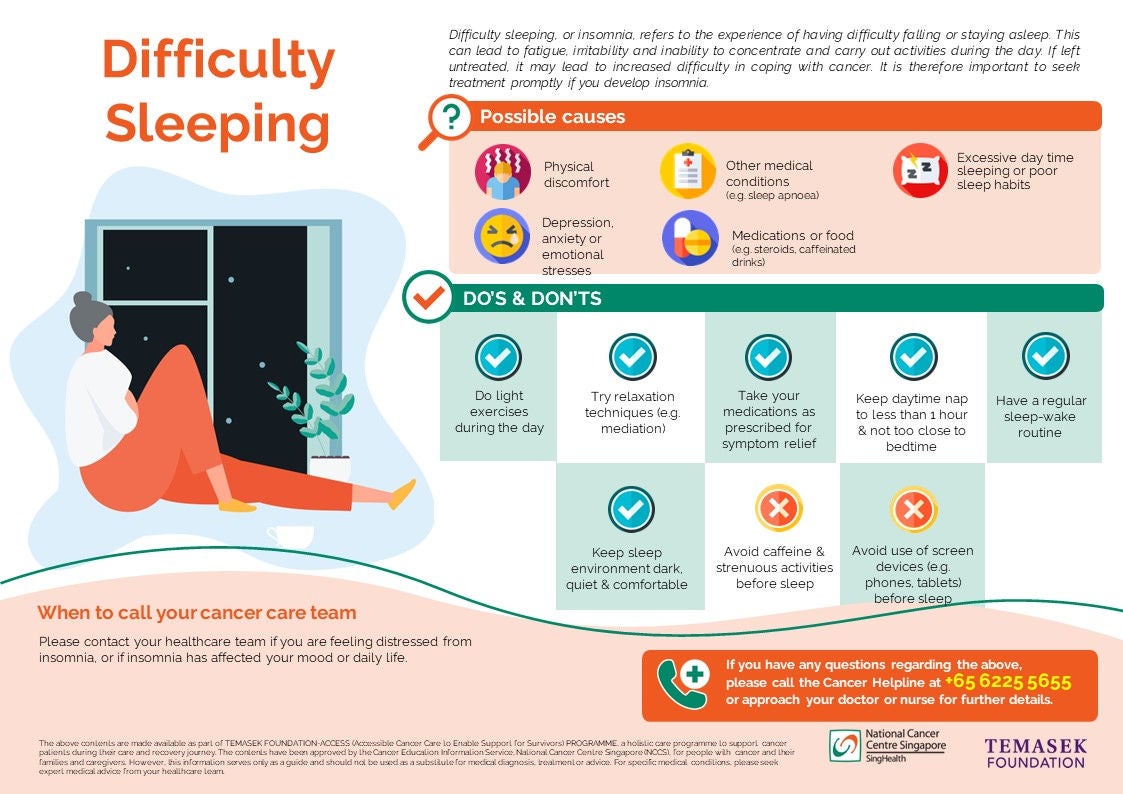National Cancer Centre Singapore will NEVER ask you to transfer money over a call. If in doubt, call the 24/7 ScamShield helpline at 1799, or visit the ScamShield website at www.scamshield.gov.sg.
Difficulty Sleeping (Insomnia)
- Allergies
- Appetite Loss
- Bone Problems
- Breathing Problems
- Constipation
- Diarrhoea
- Difficulty Swallowing (Dysphagia)
- Dry Mouth (Xerostomia)
- Difficulty Sleeping (Insomnia)
- Feeling Tired (Fatigue)
- Fevers and Infections
- Hair Loss
- Heart Problems
- Menopausal Symptoms
- Indigestion
- Joint Pains
- Limb Swelling (Lymphedema)
- Muscle Aches
- Nail Changes
- Nausea and Vomiting
- Pain
- Tingling or Numbness in Hands or Feet (Peripheral Neuropathy)
- Skin Changes
- Sore Mouth (Oral Mucositis)
- Taste Changes

Insomnia refers to the experience of having difficulty falling or staying asleep, and as a result being unable to obtain adequate sleep over a prolonged period of time. This can lead to fatigue, irritability and inability to concentrate and carry out activities during the day. Many people with serious illnesses like cancer experience insomnia. If left untreated, insomnia can aggravate other cancer and treatment-related conditions (e.g. pain, fatigue), and cause increased difficulty in coping with cancer. It is therefore important to seek treatment promptly if you develop insomnia.
What you need to look out for
- Difficulty falling asleep
- Difficulty staying asleep
- Waking up too early and unable to get back to sleep
Causes of Insomnia
- Physical discomfort or uncontrolled symptoms
- Medications or foods (e.g. corticosteroids, caffeine beverages)
- Excessive day time sleeping (e.g. due to cancer or treatment related fatigue) leading to difficulty in falling or staying asleep at night
- Psychological problems (e.g. anxiety, depression)
- Stress or worrying (e.g. health, finances, work or family)
- Other medical conditions affecting sleep (e.g. restless legs syndrome, urinary problems, hyperthyroidism, sleep apnoea)
- Poor sleep habits (e.g. excessive media consumption, late night strenuous exercise)
How it can be treated
The treatment for insomnia depends on its cause. Your doctor will ask you more questions and do a physical examination, to identify the reason and decide on the treatment for your insomnia. For instance, if uncontrolled pain is keeping you up at night, your doctor will manage the pain to allow you to sleep better. If stresses like finances or work are the cause of your insomnia, your doctor may refer you to the medical social worker or counsellor who can assist you to cope better with these issues. You may also be advised on lifestyle modifications (see “What you can do” below) to promote a more regular sleep pattern.
If your insomnia persists despite treating the cause, your doctor may prescribe medications to help you sleep better (e.g. lorazepam, diazepam, zolpidem). You should use these medications only at the advice of your healthcare provider, as inappropriate use can lead to undesirable side effects.
What you can do
Here are some tips to help you cope better with insomnia:
|
|
When to call your cancer care team
Please inform your doctor or nurse if you are feeling very distressed from being unable to sleep, your insomnia persists despite treatment, or if you experience any side effects from the medications prescribed to help with your sleep.
If you have any questions regarding the above information, please call the Cancer Helpline at +65 6225 5655 or approach your doctor or nurse for further details.
Click here to download the PDF version of this article.
如果您要下载本文的中文版本,请点击此处。
Klik di sini untuk memuat turun versi PDF artikel ini.
The above contents are made available as part of TEMASEK FOUNDATION-ACCESS (Accessible Cancer Care to Enable Support for Survivors) PROGRAMME, a holistic care programme to support cancer patients during their care and recovery journey.
The contents have been approved by the Cancer Education Information Service, National Cancer Centre Singapore (NCCS), for people with cancer and their families and caregivers. However, this information serves only as a guide and should not be used as a substitute for medical diagnosis, treatment or advice. For specific medical conditions, please seek expert medical advice from your healthcare team.
Brought to you by:
![]()
![]()
Keep Healthy With
© 2025 SingHealth Group. All Rights Reserved.

















